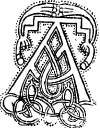
Ancient Laws of Ireland
ANCIENT LAW

S in law and all other branches of learning some knowledge of one system is useful in the study of any other system, so also one cannot well appreciate the relative proportions and importance of what belongs to one nation without taking some account of the condition in the same respect at the same period of neighbouring nations with which a comparison may be instituted. For this reason I think our present subject should be introduced by a preliminary notice of the condition of law in early times in neighbouring nations with which we are liable to be compared. We can, however, scarcely do more than glance at one such nation; and remembering where we are, and the circumstances' of our country, the English nation seems the most appropriate for our purpose.
The first collection of Saxon laws into writing was made under Æthelbirht, king of Kent, after Saint Augustine had converted him to Christianity and baptised him. This occurred about the beginning of the seventh century, Saint Augustine having arrived in Kent in A.D. 597. Æthelbirht's was a collection of the most meagre scraps, such as only extreme poverty in this respect could make any people consider worth collecting or preserving. After that time collections of laws continued to be made occasionally in Kent and the various little kingdoms into which England was then divided; but none of them reached respectable dimensions until that of Alfred the Great, towards the end of the ninth century. Alfred is said to have been educated in Ireland. His is the earliest collection the English nation can show of any real value. Besides those given under Alfred's own name, it is probable that he may also be credited with the so-called Dooms of Ine.
It is believed that none of the originals of the early English laws, or works relating to law, were written in the language of the English people, that the originals in Saxon times were always in Latin, and those of Norman times in Latin or Norman-French, and that the copies of the Saxon Dooms now extant are transcripts from the translations made for vulgar use. The originals of Acts of Parliament continued to be written in Norman-French down to the beginning of the sixteenth century, and the records in legal proceedings down to the middle of the eighteenth century. The brand of native inferiority, first impressed upon the people, continued thus long impressed upon the laws the people were bound to obey. Even in this year of grace, 1894, the royal assent is given to Acts of Parliament in words which neither the Queen nor her subjects understand, and which never were used by any generation of Englishmen.
Bearing in mind these few facts regarding the early condition and historical development of English law, we come in a proper mood to consider the most archaic system of law and jurisprudence of Western Europe, of which many records now exist, namely, what are now generally known as the Brehon Laws. This is not their real name. Irish Laws, or Gaelic Laws, would be a better name for English speakers to use; but the thing meant has always been known to Gaelic speakers as Feineachus. A general term for all law, without special reference to that of Ireland, was Recht. But the law of the Gaels was Feineachus. It included Cain Law, being that which was enacted or solemnly sanctioned by national assemblies, was of universal obligation, and could be administered only by professional judges; and it also included Urradhus Law, which was law relating to local matters, modified by local assemblies and by local customs, and which might be administered by the Flaiths who were not professional lawyers.
